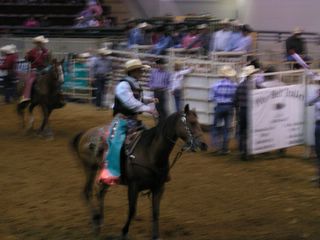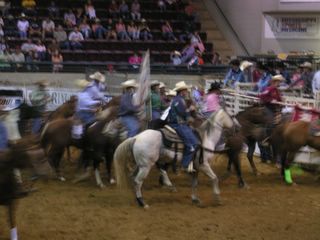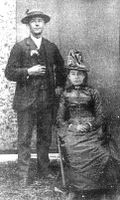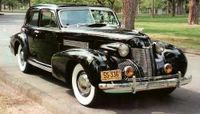I did in fact manage to get to the Mississippi high school rodeo
championships last week, and they were really great. When I got there,
the outgoing Rodeo Queen (elected by virtue of her beauty, academic
achievements, and horsemanship) was making her final gallop around the
ring. She was wearing lots of sequins and a big cowboy hat, but her
riding gear was sensible and not skimpy. Her hair was flying. I tried
to take a picture but what with the dark and the galloping, it didn't
turn out too great. Then the new Rodeo Queen took a lap. To "recognize
the culture of the very first Americans" they played a recording of
Amazing Grace sung in some Native American language (they didn't say
which one) and everyone sat there respectfully. Then they played the
anthem and of course we all stood up. The folks wearing cowboy hats
took them off. They talked about how America was great, and high
school rodeo was great.
The first event was bronco-riding, and only three guys competed. The
announcer was very supportive. Some guy got thrown in the first two
seconds, and he said, "now, this just doesn't do justice to this young
man's year, he's had a phenomenal year. This will be his last bronco
in high school - send him out of here with a big round of applause."
And everyone did. The next event was calf lassoing, which was all
girls. (Caring for young animals being a feminine skill?) They'd
launch this little calf out the gate, and it would scamper across the
arena. The girl would gallop along behind it and try to get her lasso
around its neck. This looked sort of awful, particularly when she'd
nab one and her horse would go one way and the calf the other. But the
calves didn't seem to mind very much, or maybe they were just too dumb
to remember from one moment to the other - after they got lassoed,
they'd just stand there calmly or wander across the rink until the
helper-cowboys hustled up to shoo them back into their stalls.
The even more pathetic looking event was the boy version of this. The
boy would lasso the calf at a gallop, hurl himself off his horse, run
up to the calf, shove his knee into it, pull up as many of its legs as
he could manage, which would tip it over onto its side. Then he would
tie all its legs together. The good kids (and remember, these boys are
18 at most) could do this in under ten seconds. This event looked even
more pitiful than the roping - sometimes the overexcited horse would
get antsy during the tying part and start dragging the tied up calf
around the arena. But again, the calves were just too dumb to inspire
much sympathy - they didn't hardly seem to notice what was going on,
and when they were untied, they'd trot right out of the arena. Maybe
they'd been practiced on a lot, and they just thought this was what
life was like. Sometimes you get hog tied and dragged around. But they
always let you up eventually and then you get some food!


































 A few of my daughter
Melina's great posts:
A few of my daughter
Melina's great posts:







